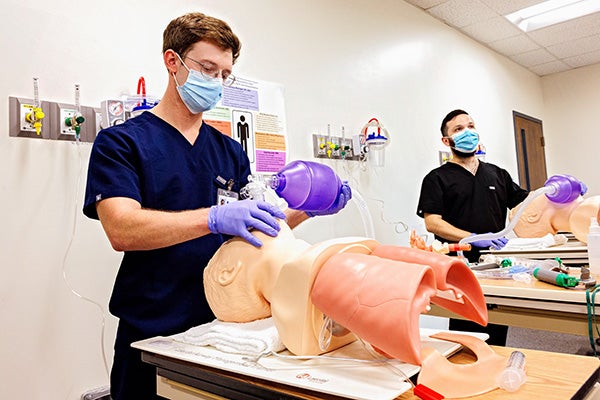Brody’s interprofessional clinical simulation program earns full accreditation
One of the most modern and engaging medical education programs at East Carolina University’s Brody School of Medicine has received full accreditation from an international organization that advocates for best practices.

The Interprofessional Clinical Simulation Program at East Carolina University’s Brody School of Medicine has received full accreditation by the Society for Simulation in Healthcare in the area of teaching and education. (Photo by Cliff Hollis)
The Society for Simulation in Healthcare (SSH) has awarded Brody’s Interprofessional Clinical Simulation Program full accreditation in teaching and education, ensuring the program meets international best practices and provides high-quality education, research and innovation.
“Full accreditation will allow us to continue to move the Interprofessional Clinical Simulation Program forward in providing safe, high-quality, interprofessional reality-based education, and become an integral part of the newly established ECU Health,” said Dr. Walter “Skip” Robey III, Brody’s assistant dean for clinical simulation.
The announcement comes only two years after the program received provisional accreditation. In December, a team of reviewers inspected Brody’s simulation center during a site visit and interviewed students, educators, staff and community stakeholders.
Those reviewers noted Brody’s programs strengths as:
- Has strong support from leadership
- Is positioned for much growth at state level
- Has a dedicated staff who are all experts in simulation
“It is very rewarding to have an internationally renowned organization recognize our program as a leader in simulation,” said Becky Gilbird, Brody’s director of clinical simulation. “The site reviewers were especially impressed by the range of programs we provide in our Simulation Center. Our faculty and staff have worked tirelessly for years to build our program into the success it is today.”
The Clinical Simulation Center is an integral part of medical education for more than just Brody students, who are required to participate in a minimum of 30 simulation and skills sessions in the center before graduation.
The center also offers interprofessional programs for students from the other colleges and schools on ECU’s Health Sciences Campus, other non-ECU higher education institutions, undergraduate and high school students who are exploring health sciences professions and even health care providers from Vidant Medical Center.
The center’s mobile Healthcare Simulation Unit also takes outreach and education on the road, traveling throughout eastern North Carolina to educate health care professionals on a variety of topics including pediatric trauma and stroke response. The program also uses its MV-22 Osprey Military transport simulator to work with local military to train medical corpsman prior to deployment.
“We strive to embody ECU’s mission of service through our work to educate students and healthcare providers,” Gilbird said. “Simulation-based training leads to better patient outcomes, which is the ultimate goal.”